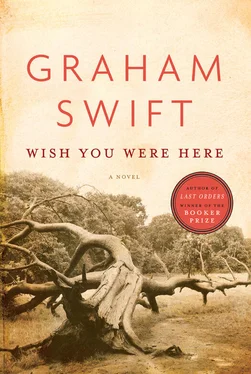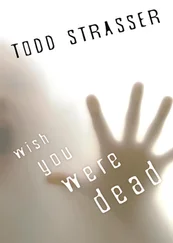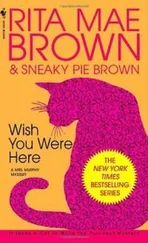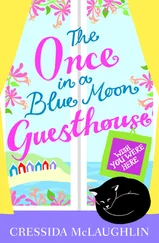Jack had said that thing about writing, and had remembered that first card to Ellie (seeing again the little fold-down table), but there was another written message that had gone with that moment in the parlour. It was almost Tom’s eighteenth birthday. It was true what Tom had said: no one bothered about birthdays these days at Jebb, they hadn’t since Vera had died. But Jack had found a moment, all the same, to go into the Warburtons’ store at Leke Hill Cross. Would they have any cards, even one for eighteen? Yes, they had. Inside the card it said: ‘You’re Eighteen! Now the World is Yours!’
Jack had desperately hoped when he’d entered the store that neither Sally nor Ken Warburton would be behind the till, so there’d have to be some conversation about Tom being eighteen now. Though he was prepared to pretend to either of them — since he was prepared to pretend to his father. But he was in luck. The shop and the whole forecourt, it seemed, was being minded by a girl who looked hardly out of school, though Jack vaguely knew her name was Hazel and she must be Tom’s age, give or take, and, while he glanced at her black-sweatered breasts (and she looked at him as if he were an old man), wondered if Tom had been there.
Jack had added some words of his own to the card and given it, sealed in its envelope, to Tom that afternoon and said, ‘Happy birthday.’ Tom had looked at Jack and after a short, questioning pause had said he wouldn’t open it yet, since it wasn’t yet the day, was it? He’d open it in the morning. And Jack had said, ‘Okay.’
Then Tom had said, ‘Well, I suppose this is when …’
And Jack had said, ‘I know.’ Then he’d said, ‘Good luck, Tom. I’ll be thinking of you.’ Which was a foolish thing perhaps to have said, because it was exactly what he’d written in the card.
And it was a foolish thing perhaps to have given Tom that card at all. Since it turned out, the next morning, that Dad had actually got Tom a card too. It went against all recent custom but, as Dad himself put it, ‘It was his bloody eighteenth.’ But by this time it was apparent, anyway, that Tom had disappeared. So Michael had been able to make a big demonstration of the card he’d specially bought for Tom: by ripping it up in front of Jack. What’s more, it was the same card, the same card with a gold, embossed ‘18’ on it and the same message inside, that Jack had bought, and that Dad, too, must have dropped into the store at Leke Hill Cross to buy. Had that girl noticed?
Jack, of course, hadn’t said and couldn’t say anything about his own card. But this had only meant that his father was able to round on him and demand: and where was his card then? If he’d known nothing about all this, where the hell was the card that Jack had got for Tom? And Jack could only answer that, well, he’d forgotten it was Tom’s birthday.
*
Tom, holding the unopened envelope in the milking parlour, had said, ‘I’ll be okay. I’ll be thinking of you too.’ And he’d looked at Jack with a look, Jack thought, that wasn’t just a brother’s look but perhaps a sort of son-and-father look too. Then he’d said, ‘Thanks, Jack. Thanks for everything. I won’t forget you.’ And Jack had never ceased to wonder about that remark.
Then they’d hugged. Jack couldn’t remember who’d put their arms out first and perhaps it didn’t matter. The last time they’d hugged each other was when Vera had just died.
‘Three o’clock,’ Tom had said.
‘Three o’clock,’ Jack had said.
Jack hadn’t had to repeat it, like some pre-agreed appointment, but he knew why he was doing so, though he didn’t actually say the words: ‘I’ll be awake, Tom.’
And so he was. He’d stayed awake pretty well all through the night — which was rare for him — just to be sure. He was awake at three o’clock to hear Tom’s stealthy departing movements, while he himself remained motionless and as if asleep.
He heard Tom creep along the passage and down the stairs. Tom would know, even in the dark, where to put his feet, which steps would creak and which wouldn’t. Those steps were part of him. Jack heard the sounds in the kitchen and then the sounds — this was tricky for Tom because the hinges were far from noiseless — of the door into the yard being opened and closed again. It was all done as quickly and as quietly as possible. If Tom had been a soldier, specially trained for such a night-time operation, you could say he’d done it well.
Jack thought he heard a few faint scuffs of footsteps as Tom crossed the yard and again as he slipped in and out of the barn. But it wasn’t a case of hearing, so much as of imagining and seeing in his head. It wasn’t difficult to do. For Jack in his head, as for Tom on his feet, the walk up the track would be like going to get the school bus when it was still dark in winter. How many times had both of them done that — always separately, because of those years between them? In the dark, but knowing every step and, because you knew every step, not using a torch, though you had one with you. The small bravery of not using it, not needing or using any light — till the blazing headlights of the school bus, rounding the bend, caught you, like the eyes of some snorting monster, and you’d be gathered up.
Tom would be thinking perhaps of all that now. Jack couldn’t hear or see Tom’s footsteps, but he could picture them, count them, every one, as if they were his own. He could see as if he were holding, even if it wasn’t needed, a torch for Tom, every thick, ropey rut, hard with frost, and the splays of ice in between. The high, hedged banks on either side, stars peeping through the thorns. The bend where, on the way down, you’d catch your first glimpse of the farmhouse, just its roof and chimney. Or where, on the way up, you’d pause to look back. Would Tom look back? But everything would be in darkness. Or if a moon was up, there’d be the glimmer, maybe, of the roof slates under which he, Jack, was lying.
One hundred, two hundred paces. Three hundred ascending, lung-rasping paces — to freedom. If that’s what it was. Was the army freedom? Tom must think it was. It wasn’t Jebb Farm. Three hundred paces, his heart thumping, breath smoking. Then the gate.
Good luck, Tom. He’d said it into his pillow as he counted him up the track and pictured him swinging quickly over the gate — there’d be no opening it. Dropping his pack over first. Then the road towards Marleston. If there was a moon, it would light up the pot-holed surface. In twenty minutes or so he’d pass the churchyard and the war memorial, and his mother’s grave. Would he pause?
Good luck, Tom. Since when had he, Jack, a grown man, ever whispered into his pillow? Or ever felt his pillow damp beneath his cheek?
Good luck, Tom.
He’d said it inside himself the next day, as if for his own preservation, when Dad had gone ballistic, after ripping up that card. And he’d said it many times, over and over, in the weeks, months and even years to come, as if to make something true that wasn’t. Till something he’d really known all along had sunk in on him. That Tom had simply gone, gone his own way. He would never hear Tom’s voice or see his face again.
MAJOR RICHARDS watched Jack walk away across the grass and disappear behind the corner of the building, and blamed himself. ‘I’d slip away if I were you …’ But that hadn’t meant the man should simply turn tail and make a beeline. ‘Slip away’ implied some tact.
Major Richards felt vaguely disappointed. Nonetheless, as he watched Jack walk away, he found himself oddly willing him on. He was walking in an intent, obstinate way, like some big child clinging to the absurd hope that he might be invisible. As a soldier might walk, Major Richards thought — though he’d never been in a position to see such a thing — from a battle.
Читать дальше








![Питер Джеймс - Wish You Were Dead [story]](/books/430350/piter-dzhejms-wish-you-were-dead-story-thumb.webp)



